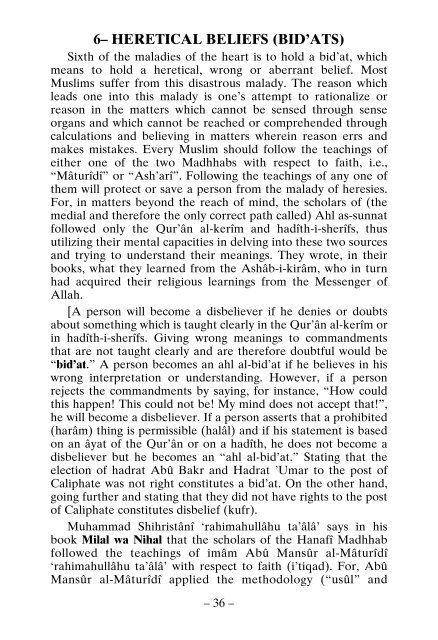Ethics of Islam
Ethics of Islam is taken from the book Berîka by Muhammad Hâdimi. Immorality and ways to get rid of it; 40 depravities and cures to them; usefulness of ethics; what is a soul; strengths of a soul; Personalities emanating from wisdom, courage, chastity and justice are extensively explained.
Ethics of Islam is taken from the book Berîka by Muhammad Hâdimi. Immorality and ways to get rid of it; 40 depravities and cures to them; usefulness of ethics; what is a soul; strengths of a soul; Personalities emanating from wisdom, courage, chastity and justice are extensively explained.
Create successful ePaper yourself
Turn your PDF publications into a flip-book with our unique Google optimized e-Paper software.
6– HERETICAL BELIEFS (BID’ATS)<br />
Sixth <strong>of</strong> the maladies <strong>of</strong> the heart is to hold a bid’at, which<br />
means to hold a heretical, wrong or aberrant belief. Most<br />
Muslims suffer from this disastrous malady. The reason which<br />
leads one into this malady is one’s attempt to rationalize or<br />
reason in the matters which cannot be sensed through sense<br />
organs and which cannot be reached or comprehended through<br />
calculations and believing in matters wherein reason errs and<br />
makes mistakes. Every Muslim should follow the teachings <strong>of</strong><br />
either one <strong>of</strong> the two Madhhabs with respect to faith, i.e.,<br />
“Mâturîdî” or “Ash’arî”. Following the teachings <strong>of</strong> any one <strong>of</strong><br />
them will protect or save a person from the malady <strong>of</strong> heresies.<br />
For, in matters beyond the reach <strong>of</strong> mind, the scholars <strong>of</strong> (the<br />
medial and therefore the only correct path called) Ahl as-sunnat<br />
followed only the Qur’ân al-kerîm and hadîth-i-sherîfs, thus<br />
utilizing their mental capacities in delving into these two sources<br />
and trying to understand their meanings. They wrote, in their<br />
books, what they learned from the Ashâb-i-kirâm, who in turn<br />
had acquired their religious learnings from the Messenger <strong>of</strong><br />
Allah.<br />
[A person will become a disbeliever if he denies or doubts<br />
about something which is taught clearly in the Qur’ân al-kerîm or<br />
in hadîth-i-sherîfs. Giving wrong meanings to commandments<br />
that are not taught clearly and are therefore doubtful would be<br />
“bid’at.” A person becomes an ahl al-bid’at if he believes in his<br />
wrong interpretation or understanding. However, if a person<br />
rejects the commandments by saying, for instance, “How could<br />
this happen! This could not be! My mind does not accept that!”,<br />
he will become a disbeliever. If a person asserts that a prohibited<br />
(harâm) thing is permissible (halâl) and if his statement is based<br />
on an âyat <strong>of</strong> the Qur’ân or on a hadîth, he does not become a<br />
disbeliever but he becomes an “ahl al-bid’at.” Stating that the<br />
election <strong>of</strong> hadrat Abû Bakr and Hadrat ’Umar to the post <strong>of</strong><br />
Caliphate was not right constitutes a bid’at. On the other hand,<br />
going further and stating that they did not have rights to the post<br />
<strong>of</strong> Caliphate constitutes disbelief (kufr).<br />
Muhammad Shihristânî ‘rahimahullâhu ta’âlâ’ says in his<br />
book Milal wa Nihal that the scholars <strong>of</strong> the Hanafî Madhhab<br />
followed the teachings <strong>of</strong> imâm Abû Mansûr al-Mâturîdî<br />
‘rahimahullâhu ta’âlâ’ with respect to faith (i’tiqad). For, Abû<br />
Mansûr al-Mâturîdî applied the methodology (“usûl” and<br />
– 36 –

















